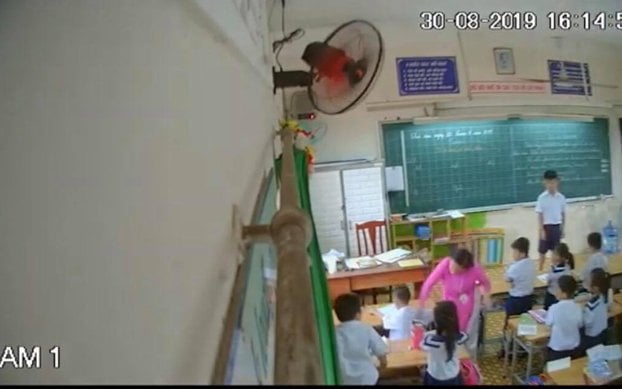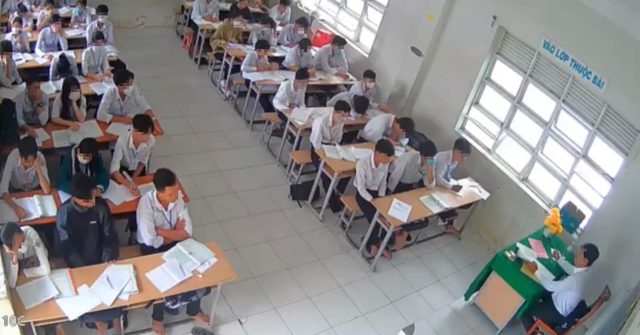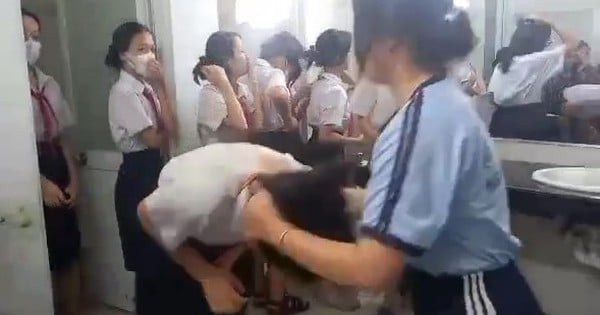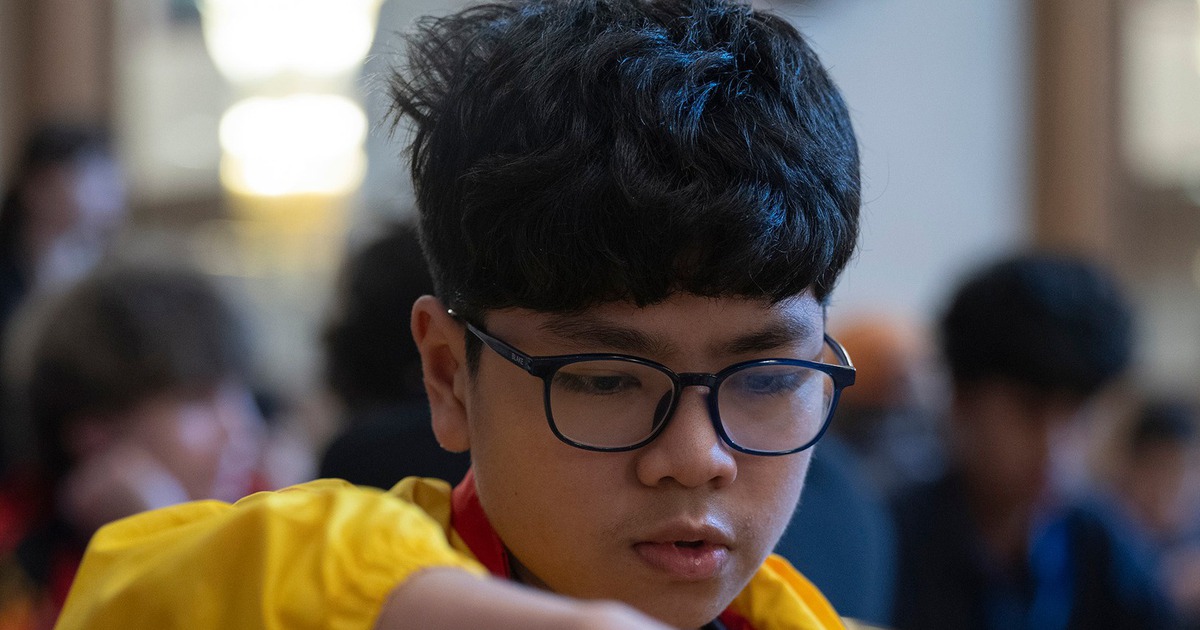
A few years ago, a teacher who pinched and scolded elementary school students was forced to quit her job.
That is the sentiment of a literature teacher at a public high school in Ho Chi Minh City. She said that the teacher calling the students "buffalo-headed, dog-headed" was wrong, there is no denying it. But a more tolerant view is needed, because "everyone has anger and pent-up frustration, and not everyone can stay calm at that time". Teachers need to criticize and be strict with students, but there needs to be a stopping point.
Quick view 8pm: Developments in the case of a teacher calling a student 'buffalo head'
There are times when I feel so angry because my students are so unruly.
The literature teacher said that due to the nature and specificity of their profession, most teachers are emotional people and are easily understanding, forgiving and forgiving of their students' mistakes. Teachers often put love and responsibility above anger, with the aim of being patient, together with family and society, educating and shaping students into good people.
"Teachers are also human, and sometimes they get angry because students are too unruly, disruptive, and do not care about acquiring knowledge. Teachers always hope that students come to school to practice morality, explore knowledge, and become good and excellent citizens. When teachers devote all their attention to the subject and class and have reminded many times but students still do not cooperate, it is natural to get angry. I think teachers need to have the right to scold and analyze for students to understand, not always stay silent and let the lesson end. Scold and analyze, not scold students or insult them. When students grasp knowledge, they will both receive knowledge and practice discipline and work scientifically. That means teaching words in parallel with teaching people," shared a literature teacher in Ho Chi Minh City.
A teacher at a public high school also believes that if teachers choose the "safe path" of not scolding students, just silently teaching, implementing lessons, and leaving students alone with how they learn, then teaching is not complete.
"There are times when I get angry and scold students. But I often put myself in the students' shoes. I see that at the age of high school students, they often want to show off and resist when they are severely attacked. Therefore, I try to speak in a way that makes them understand and know that: others will also respect and be polite to you when you respect others," the teacher shared.
The female teacher shared her own experience of not naming the students who were criticized, to avoid hurting them. However, she always had to remind herself: "take a deep breath, control yourself as much as possible, and avoid getting angry and losing your mind."
"I reminded them in many lessons, enough for the whole class to learn from the common experience. I also told myself to breathe deeply, try to control myself, and avoid saying harsh words to students. Because when someone is angry, it is difficult to control their tone and words. Once the words are said, they cannot be taken back," she confided.

Teacher cursed students "buffalo head, dog head..." in class, incident happened in Ca Mau
Teachers are also inspirational people.
A high school teacher in Binh Thanh District, Ho Chi Minh City, said that increasingly, the role of teachers is not only to impart knowledge but also to guide and inspire the younger generation. When a teacher calls a student “buffalo head, dog head…” it can have a negative impact on the learning process, psychology, and spirit of the student.
"Instead of using discriminatory language or swearing at students, teachers can find other ways to solve problems and convey messages more effectively. Respectful communication, giving constructive feedback and encouraging personal growth are methods that teachers can apply to create a truly positive learning environment," the male teacher shared.
Scold your students but don't let anger get the better of you.
Recently, a teacher in Ca Mau called a student "buffalo-headed, dog-headed..." causing a stir. I also received feedback from students, a teacher was angry because a student could not do his homework, so he shouted in class "stupid mind, developed limbs". A colleague said that when he was in high school (before 1975), a teacher commented on a student's report card: "stupid, stubborn, and lazy"...
Although it is not common for teachers to scold students with anti-pedagogical language, it happens at every level and in every era. The only difference is that now, teachers' "every move" on the podium can be recorded by phones and cameras.
As a teacher, I have a few things to share. First of all, the classroom - where teachers scold students - and the cyberspace - where the incident is "posted" - are very different. The threshold of "spare the rod, spoil the child", standing in the 4.0 reference system, everything can go in a bad direction.
Teaching, no matter where, in which school, there are always stubborn students, students who neglect their studies, and students who violate school rules - the only difference is the number and degree. Educational psychology and teaching methods always emphasize the need to be persuasive, profound, and persistent in dealing with "wild horses in the schoolyard". Use personality to educate personality.
From past to present, students No one likes to be scolded badly by teachers, especially in front of the school or the class. That does not help students become good people, but sometimes leaves trauma in their souls, which can cause unpredictable consequences. Young people are full of resistance, so students of any era will not accept it, especially now that they have smartphones, Zalo, Facebook. At that time, the teacher's scolding of students as "buffalo head, dog head", "buffalo brain"... even if you want to take it back, it is too late.
When teaching, teachers are quite independent. They are both guides, coaches and referees. Therefore, interactions with students must be controlled. How? It is the ability - responsibility - closeness - forecasting - solving situations, through lesson plans and organizing activities in a professional, dynamic, delicate and understanding manner of teachers. Understanding students, grasping the situation of the class assigned to teach, homeroom teachers, and mastering lesson plans will help teachers master the situation, no matter how unexpected or complicated it is.
Standing at the podium and showing such a role, teachers will never use inappropriate words or lose control of their behavior, no matter the circumstances. Teaching is such a difficult profession, because it is said that "growing people" is very difficult.
Dr. Nguyen Hoang Chuong
Source link


![[Photo] Nhan Dan Newspaper announces the project "Love Vietnam so much"](https://vstatic.vietnam.vn/vietnam/resource/IMAGE/2025/4/17/362f882012d3432783fc92fab1b3e980)

![[Photo] National Assembly Chairman Tran Thanh Man meets with outstanding workers in the oil and gas industry](https://vstatic.vietnam.vn/vietnam/resource/IMAGE/2025/4/17/1d0de4026b75434ab34279624db7ee4a)
![[Photo] Promoting friendship, solidarity and cooperation between the armies and people of the two countries](https://vstatic.vietnam.vn/vietnam/resource/IMAGE/2025/4/17/0c4d087864f14092aed77252590b6bae)
![[Photo] Closing of the 4th Summit of the Partnership for Green Growth and the Global Goals](https://vstatic.vietnam.vn/vietnam/resource/IMAGE/2025/4/17/c0a0df9852c84e58be0a8b939189c85a)
![[Photo] General Secretary To Lam receives French Ambassador to Vietnam Olivier Brochet](https://vstatic.vietnam.vn/vietnam/resource/IMAGE/2025/4/17/49224f0f12e84b66a73b17eb251f7278)























![[Photo] Welcoming ceremony for Chinese Defense Minister and delegation for friendship exchange](https://vstatic.vietnam.vn/vietnam/resource/IMAGE/2025/4/17/fadd533046594e5cacbb28de4c4d5655)




























![[Video] Viettel officially puts into operation the largest submarine optical cable line in Vietnam](https://vstatic.vietnam.vn/vietnam/resource/IMAGE/2025/4/17/f19008c6010c4a538cc422cb791ca0a1)






































Comment (0)